
Bush offended Representative Elijah Cummings (D-MD) by asking if he had ever "smoked blunts or had lots of 'hos".
A Madness of King George Special Report
by investigative reporter Quake Babylon
Bush tried to make nice at first, by meeting with members of the U.S. Congressional Black Caucus soon after the inauguration. He promised the caucus that the White House would personaly look into the voting irregularities scandal. Many critics scoffed it would be as effective as when the CIA investigated itself for drug running. Despite mounds of testimony suggesting otherwise, the intelligence agency found "nothing substantial, not even a gram of our most popular Bolivian blow."
Another major issue was John Ashcroft's nomination for attorney general. Black Caucus members made it abundantly clear they were not in favor of the candidate. Bush dismissed their calls for a change, however, by saying that Ashcroft "is a good, decent, white guy with views to the extreme right. I don't see a problem here."
The next major fumble by the administration was the announcement that the White House AIDS Office would be closed. The White House then quickly retracted the statement, saying it was all a mistake. "Look, President Bush is a joker," press secretary Ari Fleischer told reporters, "and I would refer you to the secretary of humor on this one."
If Bush's racial strategy was balancing precariously at the beginning of February, it stumbled, fell over a cliff and dashed itself apart upon the rocks with three consecutive blunders mid-month.
During his tour of military bases, Bush neglected to include two black members of Congress. During his visit to Fort Stewart, Georgia he was accompanied by several white politicians but Rep. Cynthia McKinney, a member of the House Armed Services Committee, wasn't invited. The next day, during a visit to Norfolk, Virginia he left out Rep. Bobby Scott.
Later that week reports leaked out that the budget for the Technology Opportunity Program would be dramatically slashed. The program, which was created to ease the technology gap between white and blacks, provides Internet access to underserved areas.
When asked about his horrible relationship with black officials and voters, Bush claimed that nothing was wrong. It was simply his way of celebrating Black History Month.
"Historectically, blacks have been made to feel as second class citizens by the powerful white elite," he explained to reporters, "I don't agree with this. But as a powerful white Republican I must honor that tradition and do my bestest to make this a historectical period of events."
The president then claimed that he would try and make it up to black members of Congress by sending them "a couple forties of malt liquor or something." Bush tried to say more, but was cut off by a harried looking Karen Hughes. The communications director severed the microphone line with a pair of scissors before shooing reporters away.
Later Ari Fleischer spoke to reporters to quell any misconceptions.
"Okay, rumors of lead in the president's drinking water are false," Fleischer said, "but I gotta toss you over to the newly created Office of Corrected Syntax for transcripts of todays events."
African-Americans, however, have already read between the lines. "Sure, it's nice that kids can look to Colin Powell or Condoleeza Rice," said an anonymous black politician, "but I'm not so sure I'd want to be working in Uncle Tom's Cabinet."